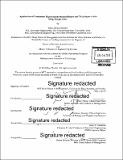| dc.contributor.advisor | Steven Spear and Anthony Sinskey. | en_US |
| dc.contributor.author | Bucher, Ryan Michael | en_US |
| dc.contributor.other | Leaders for Global Operations Program. | en_US |
| dc.date.accessioned | 2016-09-27T15:15:22Z | |
| dc.date.available | 2016-09-27T15:15:22Z | |
| dc.date.copyright | 2016 | en_US |
| dc.date.issued | 2016 | en_US |
| dc.identifier.uri | http://hdl.handle.net/1721.1/104402 | |
| dc.description | Thesis: M.B.A., Massachusetts Institute of Technology, Sloan School of Management, 2016. In conjunction with the Leaders for Global Operations Program at MIT. | en_US |
| dc.description | Thesis: S.M. in Engineering Systems, Massachusetts Institute of Technology, School of Engineering, Institute for Data, Systems, and Society, 2016. In conjunction with the Leaders for Global Operations Program at MIT. | en_US |
| dc.description | Cataloged from PDF version of thesis. | en_US |
| dc.description | Includes bibliographical references (pages 157-162). | en_US |
| dc.description.abstract | Amgen, one of the world's leaders in biotechnology, is currently investing in ways to better serve its patients by providing new drugs sooner, and to ensure its competitiveness for years to come. One way is to increase the efficiency within Research & Development (R&D), specifically within the Drug Design Cycle (DDC). This is driven by the fact that the average development time for a drug is 10-15 years and drug discovery comprises 3-6 years of this. The DDC process is the main iterative drug discovery process for designing a compound, synthesizing it, and testing it with the intent on identifying the optimal drug candidate for clinical trials, used predominately in the hit-to-lead and lead optimization phases of drug development. The scope of this effort was to apply continuous improvement methodologies and techniques to Amgen's DDC with goals to reduce overall cycle time by 30% and further develop a sustainable process for applying continuous improvement across Amgen labs. Through literature review and by implementing these continuous improvement methodologies and techniques over the six-month duration of the study, over 24 total improvements were incorporated across the primary DDC. These 24 improvements led to a total reduction of 70 days in cycle time per compound (64% improvement), exceeding initial expectations. Additional improvements during this study include: developing a novel approach to measuring quality of the drug design cycle to ensure molecule quality does not degrade with increased process speed; installing a management system to ensure improvements are sustained and roadblocks are quickly identified and addressed; creating system simulation tools to inform management of optimal assignments per chemist and where bottlenecks are likely to present themselves; and optimizing equipment and service priorities based on criticality to the drug design cycle. In total, these improvements have shown to have significant benefits in reducing cycle time and increasing the speed of learning, which has enormous potential in reducing the time to deliver drugs to patients at a reduction in the cost for development, concluding that using a methodical approach at implementing continuous improvement can have substantial benefits within a pharmaceutical R&D environment. | en_US |
| dc.description.statementofresponsibility | by Ryan Michael Bucher. | en_US |
| dc.format.extent | 162 pages | en_US |
| dc.language.iso | eng | en_US |
| dc.publisher | Massachusetts Institute of Technology | en_US |
| dc.rights | M.I.T. theses are protected by copyright. They may be viewed from this source for any purpose, but reproduction or distribution in any format is prohibited without written permission. See provided URL for inquiries about permission. | en_US |
| dc.rights.uri | http://dspace.mit.edu/handle/1721.1/7582 | en_US |
| dc.subject | Sloan School of Management. | en_US |
| dc.subject | Institute for Data, Systems, and Society. | en_US |
| dc.subject | Engineering Systems Division. | en_US |
| dc.subject | Leaders for Global Operations Program. | en_US |
| dc.title | Application of continuous improvement methodologies and techniques in the Drug Design Cycle | en_US |
| dc.type | Thesis | en_US |
| dc.description.degree | M.B.A. | en_US |
| dc.description.degree | S.M. in Engineering Systems | en_US |
| dc.contributor.department | Leaders for Global Operations Program at MIT | en_US |
| dc.contributor.department | Massachusetts Institute of Technology. Engineering Systems Division | |
| dc.contributor.department | Massachusetts Institute of Technology. Institute for Data, Systems, and Society | |
| dc.contributor.department | Sloan School of Management | |
| dc.identifier.oclc | 958277000 | en_US |
